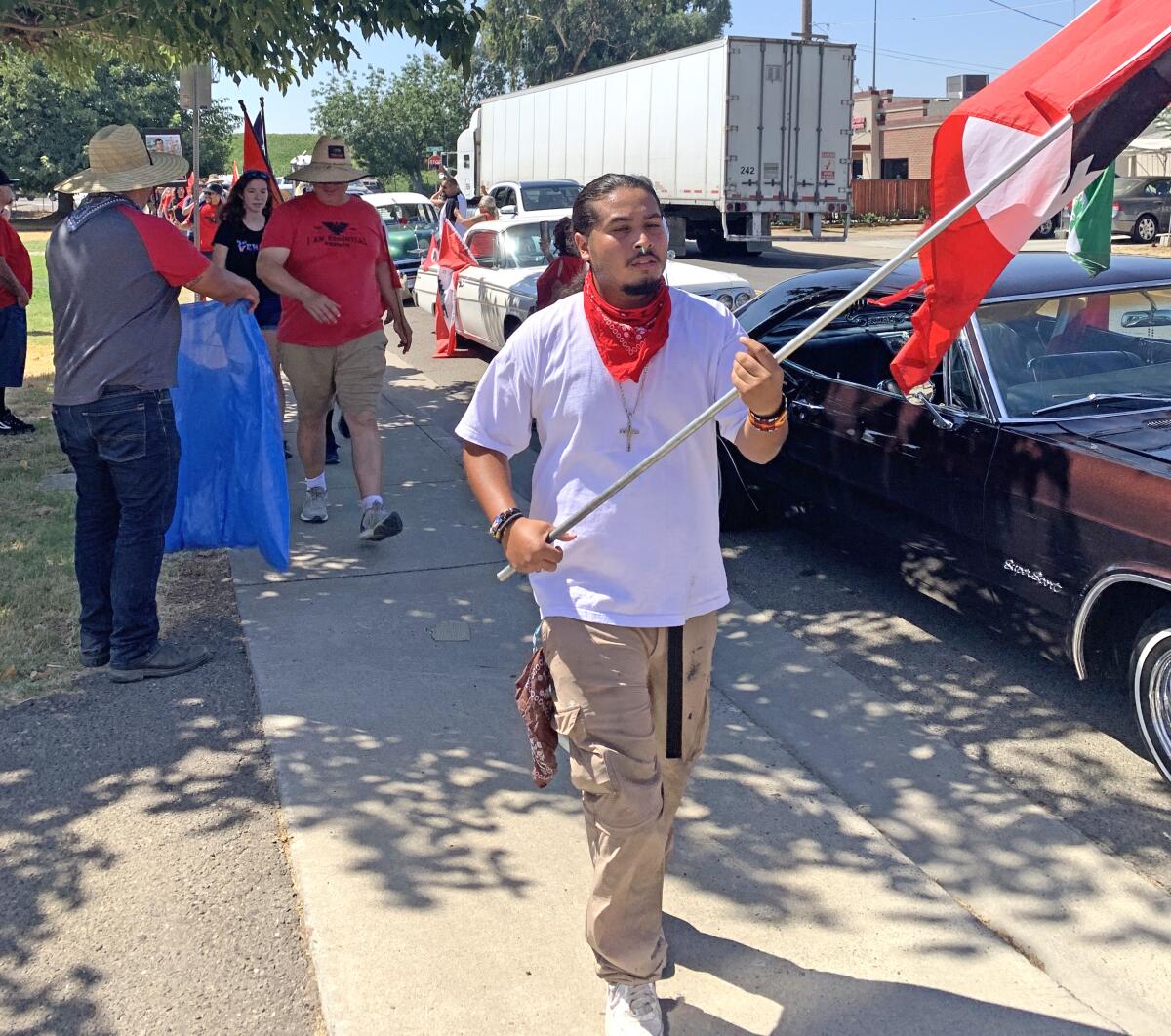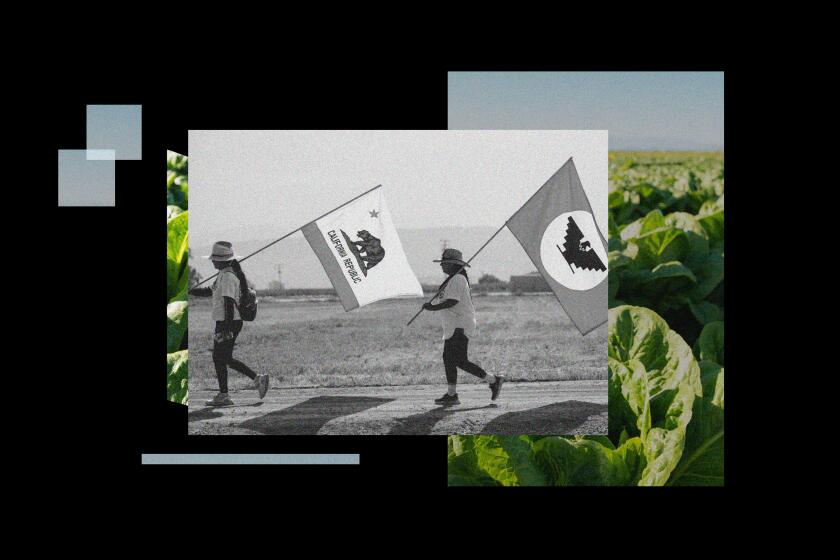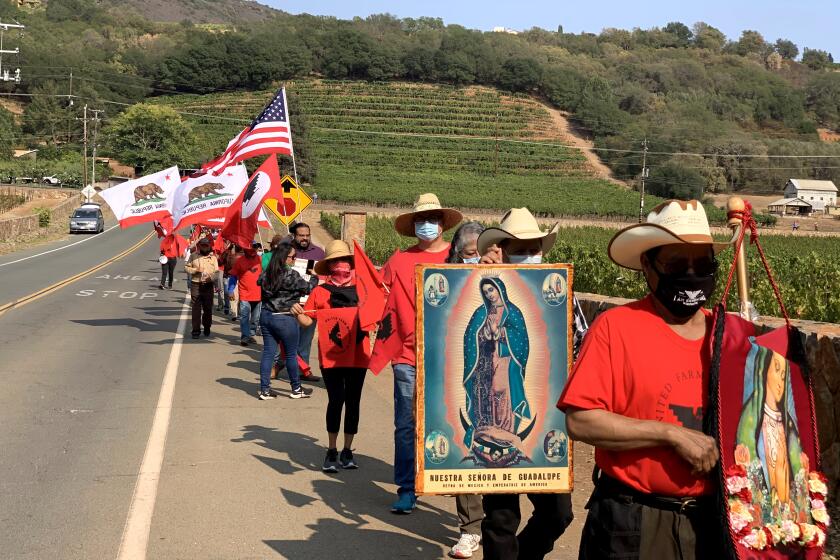Once struggling, United Farm Workers gains new clout in California, wants to use it

- Share via
CERES, Calif. — By late morning it was already hot, but not nearly as scorching as it would be in just a few hours. Lourdes Cardenas, 59, had already walked nearly eight dusty, sun-blasted miles from Turlock, with about that many more to go to the day’s destination in downtown Modesto.
At break time, a mariachi in full regalia began to play, and Cardenas sank into a chair set up under a shade structure, gathered up creams and bandages, and bent over her blistered, swollen feet.
She did not, however, consider stopping.
Cardenas, an immigrant from Mexico who has worked in California’s fields for decades, is among a small group of farmworkers who, for the first time in nearly 30 years, are marching 335 miles from the UFW’s headquarters near Delano to the state Capitol.
Officially, the three-week pilgrimage is aimed at pressuring Gov. Gavin Newsom into signing a bill that would allow farmworkers a choice, including vote-by-mail, in how elections are held in unionization drives. But the purpose is broader: to signify the union is emboldened despite decades of diminishing membership.
“Enough is enough,” said Teresa Romero, the president of the UFW. People need to understand, she said, “that without this immigrant workforce, the agricultural industry in this country would disappear, and then we would have to pay a heck of a lot more for our food.”
Currently, farmworkers can vote to join the UFW only if they do so at a polling place designated by the Agricultural Relations Board, making them subject to retaliation, the union argues. New ways of voting sanctioned by Assembly Bill 2183 would change that. Newsom vetoed a similar bill last year, prompting the UFW to march to the French Laundry, the restaurant in Napa Valley where the governor got into political trouble after being caught dining during the COVID-19 pandemic.
But this year, the bill’s author, Mark Stone (D-Scott’s Valley), said he is working with Newsom and expects to send the governor a bill that addresses his earlier concerns. As for Newsom, his spokesperson, Anthony York, said that “the administration has been engaged on this issue for a long time,” adding: “We remain optimistic that we will be able to reach a compromise.”
Farmworkers raise their voice with march to Sacramento.
Agricultural interests have opposed the law, but AB 2183 has another powerful voice in Sacramento: Lorena Gonzalez, the former assemblywoman and daughter of a farmworker who is the new head of the mighty California Labor Federation.
Gonzalez brought the UFW back into the fold of the federation, which it left in 2006, and has thrown her clout behind the bill. She said she plans to march dozens of miles with the UFW in the triple-digit heat over the weekend to underscore her support.
She’s had plenty of company. The marchers have been joined along the way by Cesar Chavez’s grandson, Andres Chavez, and by politicians, members of other unions like the Teamsters, history buffs, car-club aficionados, a motorcycle club, and the adult children of farmworkers walking in memory of their parents, along with people bringing their children to understand an important piece of California history.
And, because this pilgrimage is taking place in 2022, it also includes a truck carrying a Porta-Potty. (So far, aside from marchers’ blisters and swollen feet, the Porta-Potty is the only part of the caravan to have suffered a serious mishap — it was hit by a car, but thankfully, organizers said, it was empty at the time.)
Gonazlez said the new law is crucial for protecting farmworkers, who are often undocumented and at risk of not just being fired but also deported if they displease their bosses by trying to join a union. But beyond that, she said the law is also deeply symbolic: It will show that California has the will to protect all its workers, even its most vulnerable.
“As we continue to support workers in the high-tech industry, workers in retail, workers at Starbucks, workers in hotels, workers in every aspect of life, I think in California to support our farmworkers just ensures that mind-set,” she said. “Every poll I’ve seen shows that people are pro-union and yet we still have all these barriers. California can lead the way, if we can utilize our laws in the most proactive way possible.”
In that context, the march is a step toward boosting the union as a political force, the way it was in the 1960s and ‘70s, when young people streamed into the San Joaquin Valley to join the struggle and union contracts were won despite brutal repression from farmers and the police.
The first time the UFW marched from Delano to Sacramento was in the spring of 1966, when the union was just a few years old. Led by Chavez, who founded the UFW along with Dolores Huerta, farmworkers were trying to draw attention to the exploitive conditions in the fields and the campaign to organize workers.
By the time the marchers reached Sacramento on Easter Sunday, the UFW had signed its first labor agreement, Chavez had made the front page of the New York Times, and the union had emerged as one of the 1960s’ most potent voices for justice. The UFW also led a march from Delano to Sacramento in 1994, to commemorate the first anniversary of Chavez’s death.
Despite Chavez’s subsequent status as a national icon, whose name now graces schools, parks and streets in towns across the state, the union he led has been struggling for years. Recent estimates put membership at just 7,000, and some critics complain that the union has not spent enough time lately actually organizing workers and winning contracts.
“After the 1980s, with isolated exceptions, the UFW stopped organizing un-organized farmworkers,” said William B. Gould, a professor emeritus of law at Stanford University and the former chairman of the state’s Agricultural Labor Relations Board. “That is the brutal reality. The UFW is moribund. You can quote me on that. My three years [on the ARLB] they did nothing.”
After vetoing a bill by the United Farm Workers last year, Newsom has been on the outs with the union. Jorts the Cat isn’t happy.
Union leaders say such criticism is unfair. Because they are often undocumented, or, increasingly, temporary foreign guest workers, farmworkers are among the most vulnerable and difficult to organize members of the labor force. Long exempted from labor laws that protect workers in other sectors, they’ve long seen the deck stacked against them, experts say. Still, said Romero, the UFW president union backed-regulations such as new protections for working in heat have benefited not just represented laborers but all farmworkers.
As they marched up the Central Valley, holding flags and chanting “si se puede,” many of the participants said they were doing it to pressure the governor to sign the Agricultural Labor Relations Voting Choice Act.
“We are fighting for our rights,” said Veronica Mota, 47, a farmworker from Madera who said she was there representing “thousands of farmworkers who can’t leave their work” during the harvest season to join the fight.
But many others said they were there because of what the UFW represents to them — and the voice they hope to help give it in the future.
Rikki Mezza, who works for the state, said she was walking in memory of her father, Frutoso Meza, an immigrant from Jalisco who worked in the fields and marched with Chavez in the 1960s. She wore his photo around her neck. Other members of her family, including her sisters, planned to march on different days.
Next to Mezza, Elva Beltran climbed out of her husband’s car and began marching midway through the day, saying she had worked in the fields as a youngster and wanted to show her support.
In Ceres, the caravan picked up a police escort — summoned, organizers said, because of rumors that the march might be targeted by white supremacists. No harassment materialized, but the Rebirth Car Club of the Central Valley dispatched several brightly painted lowriders to keep a watchful eye, and members of a local motorcycle club turned up too, blasting banda music from large speakers.
Abel Martinez took the day off work to drive his cherry red 1974 Lincoln Continental beside the marchers, bringing along his wife, Sabrina, his daughter and his niece.
“We couldn’t be any more grateful for these people who are walking,” Sabrina said.
More to Read
Sign up for Essential California
The most important California stories and recommendations in your inbox every morning.
You may occasionally receive promotional content from the Los Angeles Times.
















